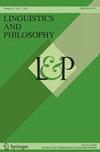牢记上下文:对明显的上下文敏感性的非语义解释
IF 1.1
1区 文学
0 LANGUAGE & LINGUISTICS
引用次数: 0
摘要
关于上下文敏感性的论证通常基于对句子真值的判断:一个句子在一个上下文中似乎是真的,而在另一个上下文中似乎是假的,因此人们认为句子的真值条件在这些上下文中会发生变化。这样的论证依赖于这样一个假设,即我们的判断反映了语境中句子的实际真值。在这里,我提出了这些判断的非语义解释。简而言之,我们对句子真值的判断是由启发式驱动的,启发式只是对实际真值的错误反映。这些启发式方法可以在不同的上下文中导致不同的真值判断,即使所讨论的句子在语义上不是上下文敏感的。作为案例研究,我考虑了斯特肯(Sterken)的《Philos》。Imprint, 15, 2015)关于一般概括的上下文敏感性的论证。我在Leslie (Philos perspective 21(1): 375-403, 2007;哲学论丛(1):1 - 47,2008。本文章由计算机程序翻译,如有差异,请以英文原文为准。
Keeping context in mind: a non-semantic explanation of apparent context-sensitivity
Abstract Arguments for context-sensitivity are often based on judgments about the truth values of sentences: a sentence seems true in one context and false in another, so it is argued that the truth conditions of the sentence shift between these contexts. Such arguments rely on the assumption that our judgments reflect the actual truth values of sentences in context. Here, I present a non-semantic explanation of these judgments. In short, our judgments about the truth values of sentences are driven by heuristics that are only fallible reflections of actual truth values. These heuristics can lead to different truth-value judgments in different contexts, even when the sentence at issue is not semantically context-sensitive. As a case study, I consider Sterken’s (Philos. Imprint, 15, 2015a) argument for the context-sensitivity of generic generalisations. I provide a non-semantic explanation of Sterken’s truth-value judgments, which builds on Leslie’s (Philos Perspect 21(1):375–403, 2007; Philos Rev 117(1):1–47, 2008) theory of default generalisation.
求助全文
通过发布文献求助,成功后即可免费获取论文全文。
去求助
来源期刊

Linguistics and Philosophy
Multiple-
CiteScore
2.60
自引率
9.10%
发文量
26
期刊介绍:
Linguistics and Philosophy focuses on issues related to structure and meaning in natural language, as addressed in the semantics, philosophy of language, pragmatics and related disciplines, in particular the following areas: philosophical theories of meaning and truth, reference, description, entailment, presupposition, implicatures, context-dependence, and speech actslinguistic theories of semantic interpretation in relation to syntactic structure and prosody, of discourse structure, lexcial semantics and semantic changepsycholinguistic theories of semantic interpretation and issues of the processing and acquisition of natural language, and the relation of semantic interpretation to other cognitive facultiesmathematical and logical properties of natural language and general aspects of computational linguisticsphilosophical questions raised by linguistics as a science: linguistics methodology, properties of linguistic theories and frameworks, and the relation of linguistics to other fields of inquiryContributions may be in the form of articles, replies, or review articles. Linguistics and Philosophy is indexed in the ISI/Social Science Citation Index.
 求助内容:
求助内容: 应助结果提醒方式:
应助结果提醒方式:


